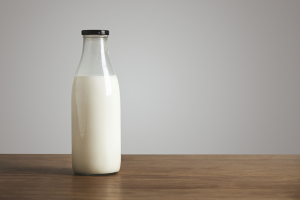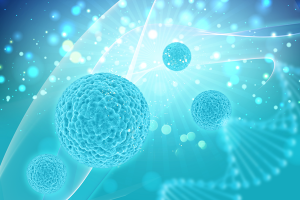
Microbe-made mozzarella: Scientists use microbes to make dairy-identical products without cows
If you are anything like me, you are going to celebrate DNA Day this year with a big slice of cake and a hearty scoop of ice cream. However, for those of you following an exclusively plant-based diet, the allure of cake and ice cream might not be as strong.
Although your local grocery store likely offers plant-based dairy products made from soy, almonds, oats and more, those options historically lack the creaminess of products produced from cow’s milk.
What if there was a way to produce cow milk without the cow? Several food-tech companies, such as Perfect Day and New Culture, have set out to do just that.
What makes ‘milk’ milk?
 Milk is a nutrient rich liquid produced by mammals primarily to feed and nourish their young. Most mammals are weaned off milk in infancy, but many humans consume animal milk from cows or goats far past infancy. Americans’ love for dairy has led to a booming dairy industry that produces milk that is consumed as a beverage and serves as a main component of products like cheese, ice cream and yogurt.
Milk is a nutrient rich liquid produced by mammals primarily to feed and nourish their young. Most mammals are weaned off milk in infancy, but many humans consume animal milk from cows or goats far past infancy. Americans’ love for dairy has led to a booming dairy industry that produces milk that is consumed as a beverage and serves as a main component of products like cheese, ice cream and yogurt.
So, how does milk make it from a cow’s udder to your refrigerator? In most industrialized countries, raw cow’s milk is processed at dairy facilities before being consumed or used in other dairy products. During processing the fat content of the milk is adjusted (this is how you can buy heavy cream and 2%, 1%, or fat-free types of milk), various vitamins are added, and potentially harmful bacteria are killed in a process called pasteurization.
Cow’s milk is a good source of protein and calcium, as well as nutrients including vitamin B12 and iodine. It also contains magnesium, which is important for bone development and muscle function. However, many people cannot drink milk because they lack an enzyme called lactase that breaks down the milk sugar, lactose. This condition, called lactose intolerance, causes abdominal pain and bloating. Still others choose to avoid cow’s milk because they follow plant-based diets for health or ethical reasons.
Plant-based milks are an option for those choosing to forego cow’s milk but plant milk often lacks the creamy texture and nutritional profile of cow’s milk. Food scientists are trying to create dairy-identical milk products that taste and feel exactly like cow’s milk but do not actually come from a cow.
In order to make these dairy-identical products, the scientists first had to figure out what exactly makes milk, milk. Although milk is synthesized in mammary glands from a variety of lipids (fats), proteins, and lactose, food scientists discovered that two proteins—casein and whey—are the key to milk’s creamy, dairy deliciousness.
Tiny protein factories
Proteins are encoded by specific sequences of DNA, called genes. By determining the sequence of the genes that produce casein and whey in cows, scientists can use tiny microbes, like yeast, fungi, or bacteria, to produce large quantities of the protein.
Using the cow DNA as a model, scientists synthesize DNA sequences containing instructions for the production of the dairy proteins. The DNA is inserted into the microbes which then produce the dairy proteins through a process called fermentation. This type of engineered microbial fermentation technology has been used for years to produce everything from insulin to vaccines to enzymes used in cheese making.
 During fermentation, carbohydrates like sugars are converted into energy without the use of oxygen. Bread and alcohol are both made using fermentation. During fermentation, the microbes are fed plant sugars and other nutrients to support abundant growth.
During fermentation, carbohydrates like sugars are converted into energy without the use of oxygen. Bread and alcohol are both made using fermentation. During fermentation, the microbes are fed plant sugars and other nutrients to support abundant growth.
They convert the sugars into energy and other fermentation byproducts, while also producing a bunch of the dairy proteins. The proteins are harvested by collecting them from within the cells or removing them from the fermentation culture liquid, depending on the type of microflora that produced them.
The biotech company New Culture takes it a step further by taking the casein proteins and turning them into larger structures called casein micelles, which more accurately mimic the natural form the protein takes when suspended in milk water. The food scientists use calcium and various salts to form the micelles which adds nutritional value to the end products made using the proteins.
Dairy-identical products
After the dairy-identical proteins have been collected from the microbes, they are combined with plant fats, water, vitamins, minerals, and other components to produce dairy-free versions of products like cheese, milk, and ice cream. The resulting products taste identical to those made with cow’s milk but lack the cholesterol, lactose, and hormones that you typically find in cow’s milk.
The proteins produced by the engineered microbes have been proven to be identical to those found in cow’s milk. Consequently, people with allergies to milk proteins like casein and whey may also be allergic to the dairy-identical products.
 Last year, the Food and Drug Administration (FDA) approved Perfect Day’s proprietary whey protein made using engineered microbes, deeming them Generally Recognized as Safe (GRAS). Perfect Day sells its whey protein to other companies that use them in their products. They recently began marketing an ice cream made with their animal-free dairy proteins. Customer reviews so far indicate that the dairy-free product is creamy and smooth like regular ice cream made from cow’s milk.
Last year, the Food and Drug Administration (FDA) approved Perfect Day’s proprietary whey protein made using engineered microbes, deeming them Generally Recognized as Safe (GRAS). Perfect Day sells its whey protein to other companies that use them in their products. They recently began marketing an ice cream made with their animal-free dairy proteins. Customer reviews so far indicate that the dairy-free product is creamy and smooth like regular ice cream made from cow’s milk.
While Perfect Day is focused on making whey protein for milks and ice creams, New Culture wants to corner the mozzarella cheese market using their casein proteins. Mozzarella is one of the most consumed cheese types in America. New Culture’s casein micelles give the mozzarella cheese a super-stretchy texture, identical to mozzarella made from cow’s milk.
Whether you chose to eat animal-free products for health reasons, ethical reasons, or just out of pure curiosity, it looks like you may have many delicious, dairy-identical options headed to your supermarket in the next few years.


